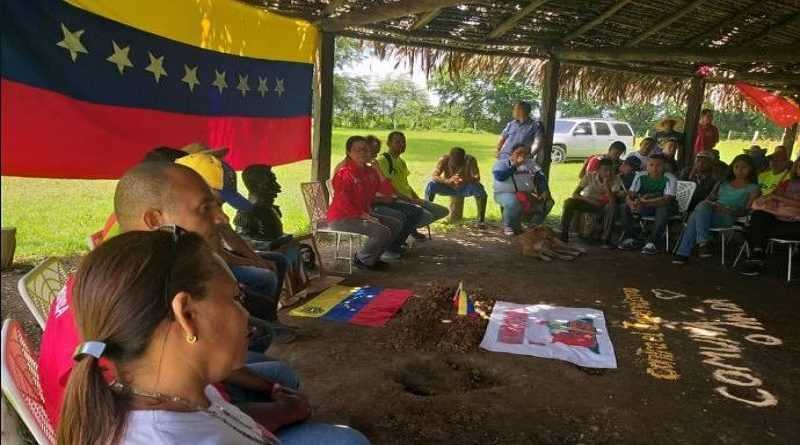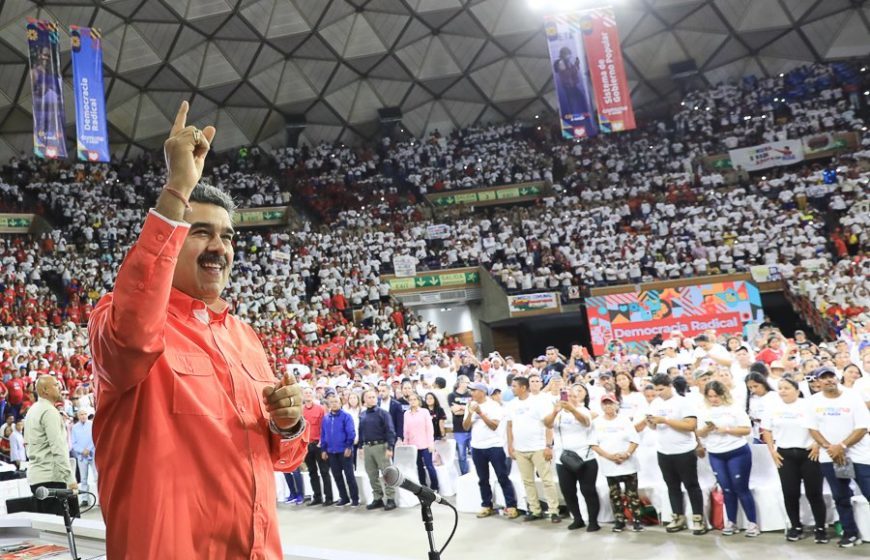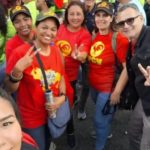The British working class is constantly invited by its ruling bourgeoisie to think of Venezuela in terms of a despotism beyond the pale, and a country dangerous to democracy. Reality shows however how Venezuela constantly improves in the way of popular participation and communal organisation. Reality also shows that it is in Britain instead that the only thing growing is McCarthism, anti-trade unionism and anti-socialism. No wonder that it is this ‘democracry’ that Venezuela endangers, if only by the many examples of democracy which it gives.
The cumbe of “el Rey Miguel” (mentioned in Thierry’s article) refers to self-organised runaway slaves and their Black leader Miguel in the Province of Venezuela. In 1552, this particular cumbe, composed of some 1,500 fugitive Mulattos, Zambos, Black and Indigenous peoples, managed to hold on to land areas whilst creating a society and an army in constant insurrection against the Spanish colonial settlements. Miguel had been born around 1510 in Puerto Rico, but was of African descent. He was killed by Spanish soldiers in 1555.
Simón Rodríguez (1769-1854) was a Venezuelan philosopher who proposed ideas on how to combine governmental power with popular policies.
The “Union Comunera” is the title of a document that was officially adopted in Venezuela in 2022. It outlines the political programme and statutes of the already functioning Union of Communes in the country, an organisation that seeks to draw on the strong communal traditions of the country. There are solidarity links between it and the working class left in Britain: https://progressive.international/blueprint/f22d35c7-3c28-4a38-a08c-820e56f29947-unin-comunera-bases-programticas-y-estatutos-2022/es
The Nostalgia of the Future is a permanent exhibition in Caracas also called “Disìo” located at the premises of the Italian Cultural Centre. It is organised into three sections: La Presenza del Futuro, Tornare (Going Back), and Passato Prossimo. It promotes debates on the state of the art. It encourages visitors to reflect on contemporary phenomena and invites them to express themselves creatively.
It is not without importance that in Venezuela, which is a Revolutionary State, the government commits to re-distributing to the population all financial returns that may accrue from the lifting of some sanctions.
Posadists Today, 28.10.23
VENEZUELA GIVES AN ACCELERATOR BOOST TO POPULAR SELF-GOVERNMENTS – Thierry Deronne, 20.10.23
The Bolivarian Revolution is an engine of profound democratisation in the political field, notably through the establishment of different types of popular self-government, most of the time in the form of communes but also in other forms of organization. This movement has its roots in the popular history of resistance to colonialism and in particular in the creation of Afro-descendant cumbes by fugitive ex-slaves, ancestors of a large part of the today’s communes. To this must be added the roots of the indigenous “common good” and, of course, the Bolivarian revolution initiated by Hugo Chávez who synthesized these roots with Marxism and the thought of “territorial government” (“toparquia”) of Simon Rodríguez, the tutor of Simón Bolívar.
There is a strong vitality in this movement. However, it is still only a minority of the population that lives in these organized territories. It takes a lot of work to transform “the spirit of the community” (Hugo Chávez) into “common sense” in a country where the private economy and commercial media still occupy a dominant place.
This is why, in recent years, the most advanced municipalities have sent brigades of the Union Communarde (“Union Comunera”) throughout the country to meet other groups in the process of organizing, to encourage emerging initiatives, to take them out of their isolation. This democratic adventure is told in our documentary “Nostalgic for the future” (1). One of the objectives is to go beyond capitalism by creating integral economic circuits, from producer to consumer, around products such as coffee, cocoa, fish, etc. Or “communal roads” to guarantee fair and direct trade, without intermediaries.

Comuna o Nada
This October 20, 2023, we commemorated in Venezuela the eleven years of the “Change of Course”, a televised meeting of 2012, passed down to posterity, where President Hugo Chávez had severely criticised his ministers for their slowness in supporting the construction of this direct democracy parallel to representative democracy, and launched his famous “The Commune or Nothing!”. Eleven years later, Nicolas Maduro and his ministers met the communes – popular self-governments – during a vast meeting in Caracas, to draw up a list of the progress, problems and proposals of the thousands of communards who had come from all over Venezuela.
The president first asked the government to purchase commune production as a matter of priority: “The Council of Vice-Presidents will have 72 hours to establish an effective mechanism to integrate commune production into the national public procurement program. There are problems to be resolved and we must resolve them on the basis of proposals that come from the base, from the organized people” stressed the Head of State, who also ordered the resumption of self-construction as a method to advance the Great Social Mission “Housing Venezuela” (2): “This mission must be planned not from the ministry, but from the territory with the organized people. The project of popular power is vital if we want to move forward in building a new society.”
Other measures announced by the Bolivarian president to support popular self-governments:
– Transfer of 15 industrial companies to popular power.
– Immediate transfer of 48 premises from Mercal and PDVAL (state-subsidized food stores), which will be reactivated as part of the creation of the National Corporation for label[1]: “Produced by the Communes”.
– Approval of 348 million 665,020 bolivars for the promotion of 43 municipal economic circuits (integral economic circuits, from producer to consumer, around products such as coffee, cocoa, fish, etc. to guarantee fair and direct trade, without intermediaries).
– 130 projects presented by Communards related to electricity, water, health, environment, gas and housing will be financed.
“As we recover national income with the partial lifting of sanctions by the United States, any inflow of money into the state coffers will go directly to municipal economic circuits, to those that exist and to those that we will create” explained Maduro, who finally asked the ministers to directly link their work agendas to the needs of popular power: “Your work agendas must take into account as a priority the plans of the municipalities”. And to conclude: “The great contribution of President Chávez to the global theory of socialism as an agent of change for justice and equality is socialism, built at the territorial, communal level, in working-class neighbourhoods, in working-class communities. Difficult to build? Yes, but essential and necessary. We need maximum power from the people! »
Thierry Deronne, Caracas, October 20, 2023 – Published by Venezuela Infos – URL of this article:
Notes:
(1) you can see this documentary online: https://venezuelainfos.wordpress.com/2023/06/08/nostalgiques-du-futur-en-ligne-les-mutins-de-pangee/
(2) This vast government program created by Hugo Chávez in 2012 aims at 5 million cheap housing units for working-class families by 2025.
Photo: Large meeting with the “Communes” in Caracas on October 20, 2023
Translated from the French by Posadists Today
[1] To certify the Appellation of a product and guarantee quality. Translator suggestion.

















